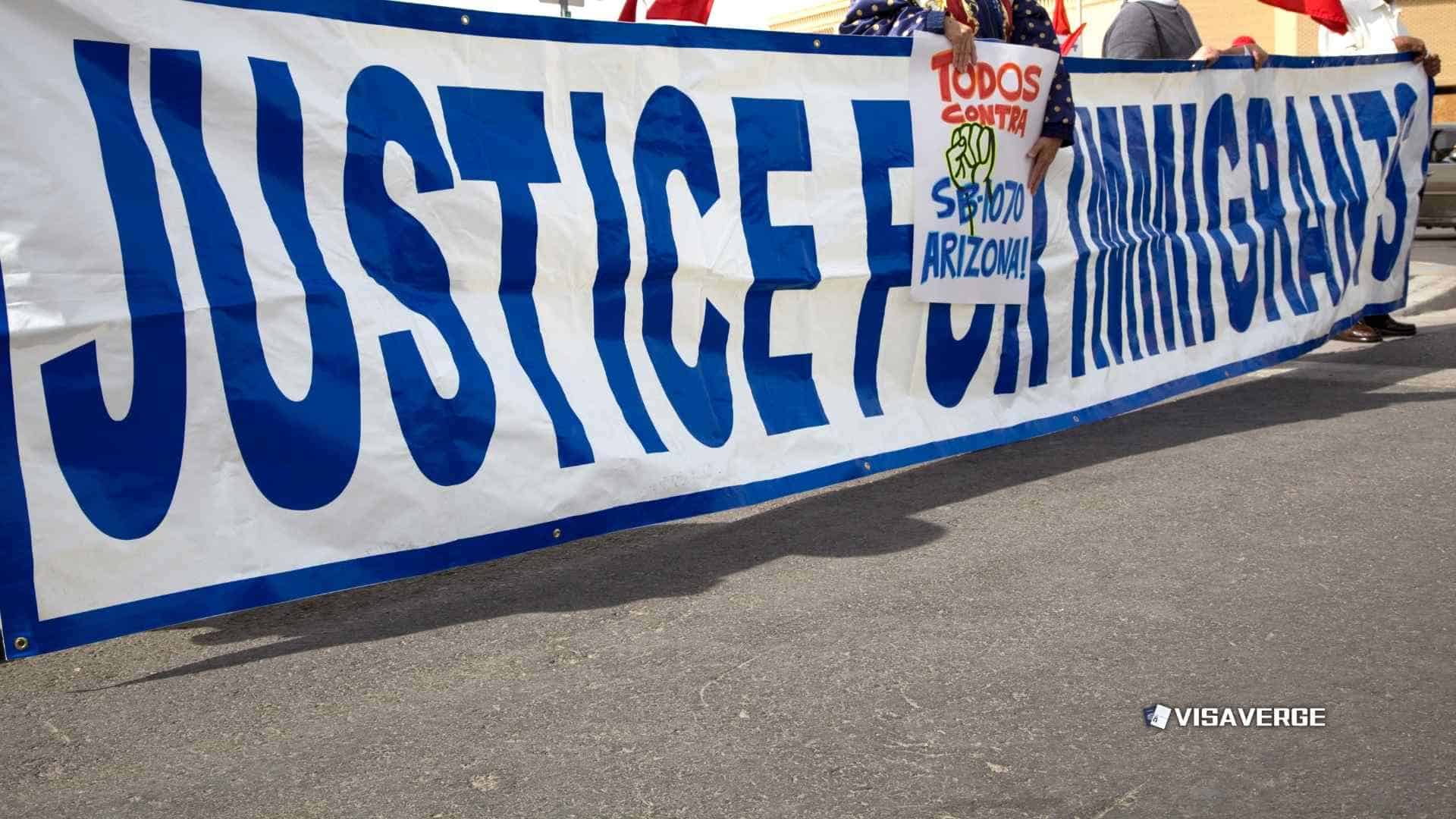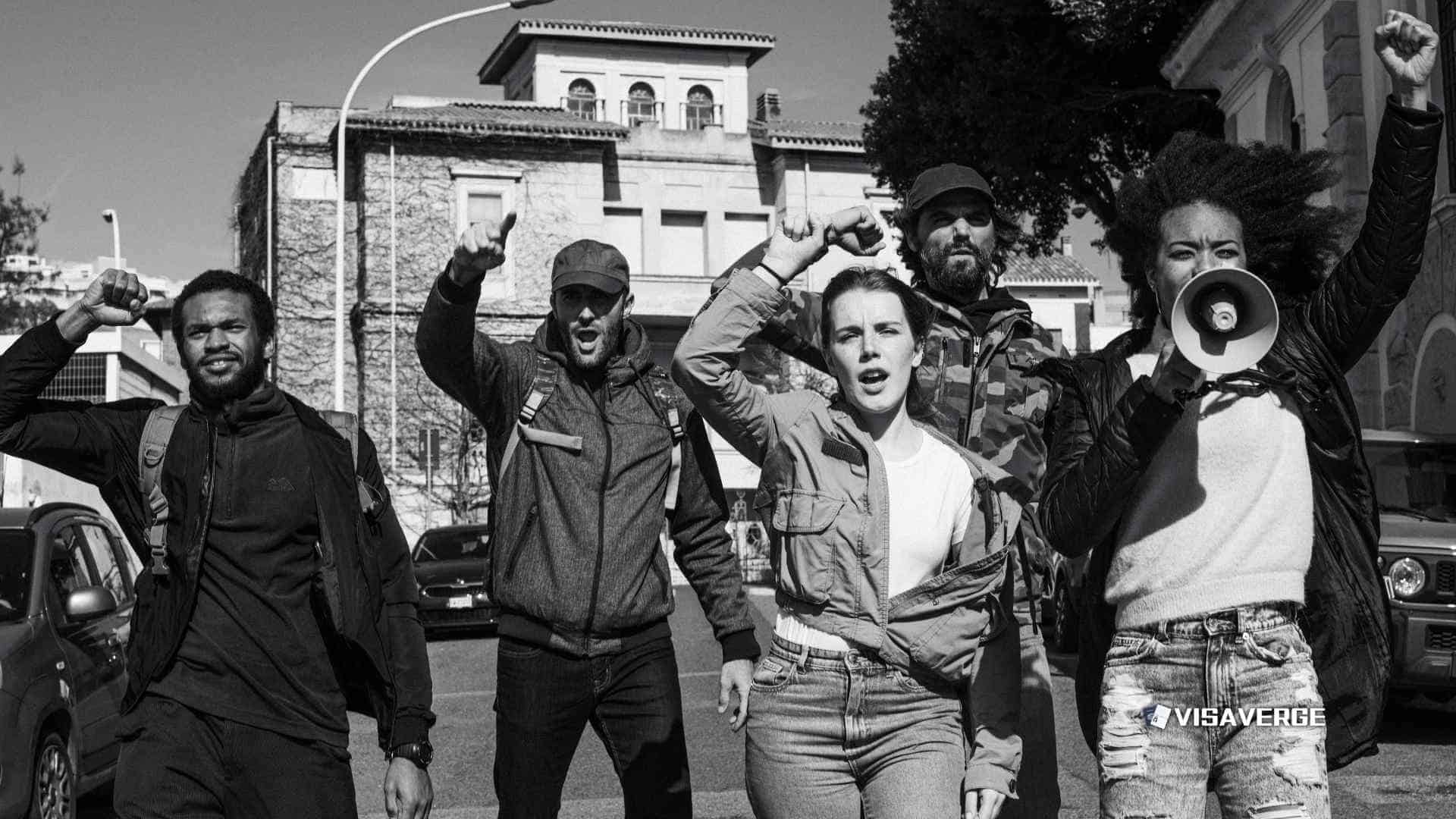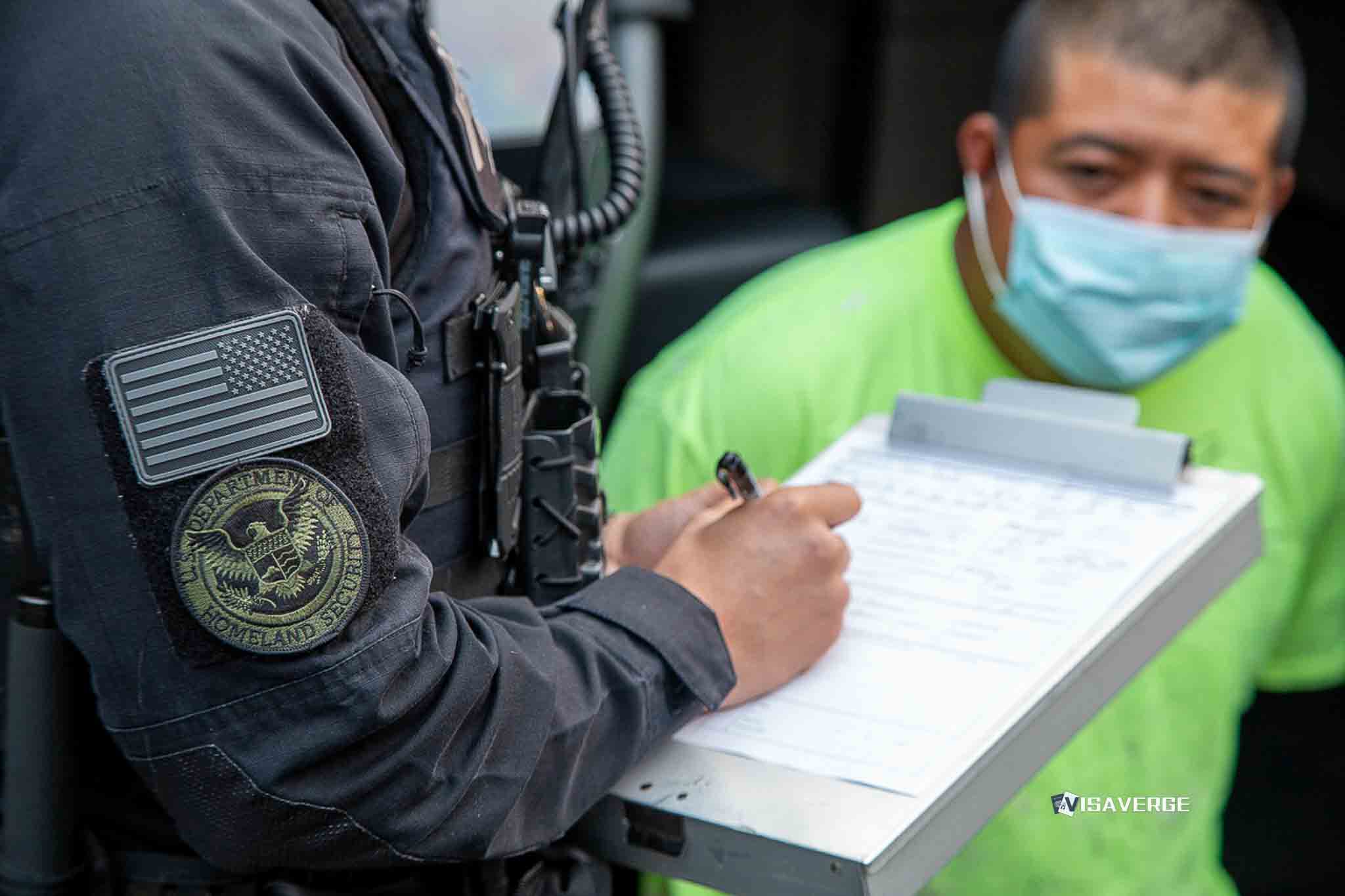As of August 2025, the Trump administration’s renewed immigration policies have placed DACA recipients, often called Dreamers, in a difficult and uncertain position. New rules and court decisions have changed how the Deferred Action for Childhood Arrivals (DACA) program works, especially in Texas, and have led to fears that Dreamers may be forced to leave the United States 🇺🇸 or lose important protections.
DACA Recipients Face New Challenges Under Trump Administration

The Trump administration has taken several steps since January 2025 that directly affect DACA recipients and other undocumented immigrants. These actions include removing protections put in place by President Biden, making it harder for immigrants to get legal benefits, and increasing the risk of deportation. The administration’s approach has been described by many as encouraging “self-deportation,” where Dreamers feel pressured to leave the country on their own because of lost rights and growing uncertainty.
Key Legal Changes and Their Immediate Impact
On January 17, 2025, the Fifth Circuit Court of Appeals made a major ruling about DACA. The court said that parts of the Biden administration’s DACA rule were unlawful. However, it allowed current DACA recipients across the country to keep renewing their status and work permits while the case continues. In Texas, though, the court made a special decision: DACA recipients there can keep their protection from deportation but lose their work permits and related benefits, such as driver’s licenses. This change took effect on March 11, 2025.
This split decision has created confusion and worry for Dreamers, especially those living in Texas. Many now face the loss of their jobs and the ability to drive legally, even though they are still protected from being deported for now. The United States Citizenship and Immigration Services (USCIS) and the Department of Homeland Security (DHS) have not yet given clear instructions on how to handle new DACA applications or renewals after this ruling, leaving many Dreamers unsure about their future.
Trump Administration’s Policy Actions in 2025
Fifth Circuit Court ruling on DACA
Change in Texas DACA protections takes effect
New executive orders issued by Trump administration
End of federal funding for legal services for unaccompanied migrant children
Signing of the ‘One Big Beautiful Bill Act’
The Trump administration has moved quickly to change immigration policies since returning to office. On July 4, 2025, the administration signed the “One Big Beautiful Bill Act” (OBBBA), which increases funding for immigration detention to $45 billion through 2029. This money will be used for family detention and even allows for the indefinite detention of children and families, a practice that health experts and human rights groups strongly oppose.
On January 20, 2025, new executive orders canceled President Biden’s immigration enforcement priorities and replaced them with stricter rules. These new policies bar undocumented immigrants from seeking asylum or other legal benefits, making it much harder for them to stay in the United States 🇺🇸. The administration has also told immigration courts to dismiss asylum claims they consider “legally deficient” without holding a hearing. This change increases the risk that people will be deported by mistake, especially those who do not have a lawyer.
In March 2025, the administration ended federal funding for legal services for unaccompanied migrant children. This means that many children who arrive in the United States 🇺🇸 alone no longer have access to free legal help, making it even harder for them to defend themselves in court.
How These Changes Affect Dreamers and DACA Recipients
The combination of court rulings and new policies has created a hostile environment for DACA recipients. In Texas, Dreamers can no longer work legally or get a driver’s license, even though they are still protected from deportation for now. Across the country, the uncertainty about how DACA applications will be handled makes it hard for Dreamers to plan their lives.
Many Dreamers feel that the Trump administration’s actions are designed to make life so difficult that they will leave the United States 🇺🇸 on their own. This is often called “self-deportation.” Without the ability to work, drive, or access other benefits, some Dreamers may feel they have no choice but to return to countries they may barely remember.
The administration’s expanded detention budget and stricter enforcement rules also increase the risk that Dreamers and other undocumented immigrants will be detained or deported. The fear of being separated from family and losing everything they have built in the United States 🇺🇸 is very real for many.
Background: The History of DACA and Dreamers
The DACA program was created in 2012 by President Obama to protect certain undocumented immigrants who were brought to the United States 🇺🇸 as children. These young people, known as Dreamers, were given protection from deportation and allowed to work legally if they met certain requirements.
The Trump administration first tried to end DACA in 2017, but courts blocked this effort. Since then, the program has faced many legal challenges and changes in policy. President Biden tried to strengthen DACA protections, but the Fifth Circuit’s 2025 ruling and the Trump administration’s new policies have reversed many of those gains.
Practical Implications for Dreamers and Their Families
For Dreamers living outside Texas, it is still possible to renew DACA status and work permits while the court case continues. However, new applications are on hold, and it is not clear when or if they will be processed. In Texas, Dreamers can renew their protection from deportation but cannot get work permits or driver’s licenses.
The Trump administration’s new rules also make it much harder for immigrants to qualify for any legal benefits. They must provide more documents and pass stricter background checks, which many cannot do. Legal help is harder to find because the administration has cut funding for legal services, especially for children and families.
Without legal representation, Dreamers and other immigrants face a complex and confusing system. Many do not know their rights or how to defend themselves in court. This increases the risk of mistakes and wrongful deportations.
Stakeholders: Who Is Involved and What Are Their Positions?
The main officials responsible for these changes are the Acting Secretary of DHS and the leaders of USCIS. They have put in place the new, stricter policies and have not yet given clear guidance on how DACA will work going forward.
The Trump administration says these changes are needed to enforce immigration laws and protect the country’s borders. However, many immigrant advocacy groups, legal experts, and human rights organizations strongly disagree. They say the new policies take away due process and basic rights from immigrants, especially Dreamers who have lived in the United States 🇺🇸 for most of their lives.
Groups like the National Immigration Law Center (NILC) and Immigrants Rising are working to provide legal resources and support to Dreamers. They are also calling on Congress to pass laws that would give Dreamers permanent protection from deportation and a path to citizenship.
Future Outlook: What Comes Next for DACA and Dreamers?
The future of DACA remains very uncertain. The program is still being challenged in court, and the Trump administration’s new policies make it harder for Dreamers to stay in the United States 🇺🇸. Many advocates worry that the administration’s actions will lead to more Dreamers leaving the country or being deported.
Immigration advocates are urging Congress to pass permanent protections for Dreamers. They say that only a new law can give Dreamers the security they need to build their lives in the United States 🇺🇸 without fear. Until then, Dreamers must live with the constant threat of losing their rights and being forced to leave the only home many of them have ever known.
Case Study: Maria’s Story
Maria is a 24-year-old DACA recipient living in Houston, Texas. She came to the United States 🇺🇸 with her parents when she was three years old. She graduated from high school with honors and has been working as a nurse’s assistant for the past two years.
After the Fifth Circuit’s ruling in January 2025, Maria lost her work permit and driver’s license. She is still protected from deportation, but she can no longer work legally or drive to her job. Maria says, “I feel like my life is on hold. I want to help people and give back to my community, but now I can’t even support myself.”
Maria’s story is not unique. Thousands of Dreamers in Texas are facing the same challenges. Many are considering leaving the United States 🇺🇸 because they see no future here without the ability to work or drive.
What Can Dreamers Do Now?
Dreamers and their families should stay informed about the latest changes to DACA and immigration policies. They can check the official USCIS DACA information page for updates and instructions on how to renew their status. It is also important to seek legal advice from trusted organizations, such as the National Immigration Law Center or Immigrants Rising, which offer resources and referrals for legal help.
Dreamers should keep copies of all important documents, such as their DACA approval notices, work permits, and any correspondence from USCIS. They should also update their contact information with USCIS to make sure they receive any new notices or instructions.
How Advocacy Groups Are Responding
Advocacy groups are working hard to support Dreamers during this difficult time. They are providing legal clinics, know-your-rights workshops, and mental health support. They are also lobbying Congress to pass laws that would give Dreamers permanent protection and a path to citizenship.
According to analysis by VisaVerge.com, these groups play a critical role in helping Dreamers understand their options and fight for their rights. They also help raise public awareness about the challenges Dreamers face and the need for fair immigration policies.
The Role of Congress and the Need for Legislative Action
Many experts agree that only Congress can provide a lasting solution for Dreamers. While court cases and executive actions can change DACA’s rules, only a new law can give Dreamers permanent protection and a clear path to citizenship.
Advocates are calling on lawmakers to pass the Dream Act or similar legislation that would allow Dreamers to stay in the United States 🇺🇸 and contribute to their communities. They argue that Dreamers are Americans in every way except on paper and deserve the chance to live without fear.
Practical Tips for Dreamers and Their Families
- Stay Informed: Check the USCIS DACA page and trusted advocacy groups for the latest updates.
- Renew DACA Status: If you are eligible, renew your DACA status as soon as possible. Processing times may be longer due to legal challenges.
- Seek Legal Help: Contact organizations like the National Immigration Law Center or Immigrants Rising for legal advice and support.
- Keep Records: Save all important documents and correspondence related to your DACA status.
- Know Your Rights: Attend know-your-rights workshops and learn what to do if you are stopped by immigration authorities.
- Take Care of Your Mental Health: Reach out to support groups and mental health professionals if you are feeling stressed or anxious.
Official Resources for DACA Recipients
- USCIS DACA Information Page: Official government site for DACA forms and updates.
- National Immigration Law Center (NILC): Legal resources and updates on DACA.
- Immigrants Rising: Support and resources for undocumented youth.
- ImmigrationLawHelp.org: Find free or low-cost legal help.
The Human Cost of Policy Changes
Behind every policy change are real people whose lives are affected. Dreamers have grown up in the United States 🇺🇸, gone to school here, and contributed to their communities. Many have families, jobs, and dreams for the future. The uncertainty and fear caused by changing policies take a heavy toll on their mental health and well-being.
Dreamers like Maria worry about being separated from their families or losing everything they have worked for. Many feel caught between two worlds, unable to fully belong in the United States 🇺🇸 or return to countries they barely remember.
The Broader Impact on Communities
The Trump administration’s policies do not just affect Dreamers. Their families, employers, schools, and communities also feel the impact. When Dreamers lose the ability to work or drive, businesses lose valuable employees, and families lose income. Schools and colleges may see fewer students able to continue their education.
Communities that have welcomed and supported Dreamers for years now face the loss of friends, neighbors, and coworkers. The fear and uncertainty spread beyond Dreamers themselves, affecting everyone who cares about them.
Legal and Policy Uncertainty
The ongoing court cases and lack of clear guidance from USCIS and DHS make it hard for Dreamers to know what will happen next. Many are afraid to apply for renewal or seek help because they do not trust the system or fear being targeted for deportation.
Legal experts warn that the lack of clear rules increases the risk of mistakes and wrongful deportations. Without legal representation, many Dreamers may not be able to defend themselves or understand their options.
Calls for Compassion and Fairness
Advocacy groups, faith leaders, and community organizations are calling for compassion and fairness in immigration policy. They argue that Dreamers deserve the chance to live and work in the United States 🇺🇸 without fear. They urge the Trump administration and Congress to remember the human cost of harsh policies and to work toward solutions that respect the dignity and rights of all immigrants.
Conclusion: The Path Forward for Dreamers
As of mid-2025, the Trump administration’s policies and court rulings have made life much harder for DACA recipients, especially in Texas. Dreamers face the loss of work permits, driver’s licenses, and the constant threat of deportation. Many feel pressured to leave the United States 🇺🇸 on their own, a situation often called “self-deportation.”
The future of DACA remains uncertain, with ongoing legal challenges and no clear path for new applicants. Advocacy groups continue to fight for Dreamers’ rights and urge Congress to pass permanent protections. In the meantime, Dreamers and their families must stay informed, seek legal help, and support each other through these difficult times.
For the latest official information and to access the DACA application form, visit the USCIS DACA page. Staying connected to trusted resources and advocacy groups can help Dreamers navigate these challenges and keep hope alive for a better future.
(Word count: 2000)
This Article in a Nutshell








